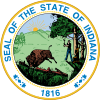| |||||||||||||||||
| Turnout | 45.2% | ||||||||||||||||
|---|---|---|---|---|---|---|---|---|---|---|---|---|---|---|---|---|---|
| |||||||||||||||||
| |||||||||||||||||

The Indianapolis mayoral election of 1967 took place on November 7, 1967. Richard Lugar defeated incumbent Democratic mayor John J. Barton, becoming the first Republican to be elected mayor of Indianapolis in nearly two-decades. Democrats had long dominated mayoral elections before 1967, having won ten of the thirteen mayoral elections since 1930. No Democrat would subsequently recapture the mayoralty until 1999, largely due to the city-county merger that created the Unigov in 1970 adding the votes of suburban Marion County, which shifted the composition the electorate towards the Republicans.
Nominations
Democratic primary
Barton was unsuccessfully challenged by Marion County Democratic Party chairman James W. Beatty. Beatty's challenge to Barton was seen as an act of retribution for Barton seeking to unseat Beatty as chairman the previous year.
Republican primary
A former member of the Indianapolis School Board, earlier that year Lugar had unsuccessfully sought to become President of the but lost by a vote of four to three. Lugar was also the former head of Community Action Against Poverty and an executive at Thomas I. Green & Co. After this, he was convinced by L. Keith Bulen, the chair of the Marion County Republican Committee, to run for mayor. Lugar was also supported by the Republican Action Committee, a group of young Republicans that had organized after the party's losses in the 1964 election cycle in order to challenge control of the party from the party establishment.
In the primary, Lugar defeated former mayor Alex M. Clark.
General election
Lugar made roughly 400 speeches over the course of his candidacy, discussing a wide variety of issues rather than focusing narrowly on a handful of issues. Among effective criticisms he lodged against Barton was criticism of the practice of open-dump burning of refuse (including in wards that had historically been strongly Democratic). He also spoke on issues such as the construction of the highway inner loop, minority demands, and a lack of adequate recreation space.
Barton had been a fairly popular incumbent. By the end of the election cycle, it had been widely anticipated that he would be reelected by a narrow margin. Lugar's win was considered to be a political upset.
Coinciding municipal elections were also swept by the Republican Party. Republicans took the city council elections with a 6 to 3 majority of seats.
| Party | Candidate | Votes | % | |
|---|---|---|---|---|
| Republican | Richard Lugar | 72,278 | 53.3 | |
| Democratic | John J. Barton (incumbent) | 63,284 | 46.7 | |
| Turnout | 135,562 | 45.2 | ||
| Majority | 8,994 | 6.6 | ||
| Republican gain from Democratic | ||||
See also
References
- ^ "Running for Mayor". Indiana University Bloomington. Retrieved September 11, 2019.
- King, Seth S. (October 31, 1971). "MAYOR IN INDIANA FACES CHALLENGE". New York Times. Retrieved September 11, 2019.
- Rickett, Christopher (April 29, 2019). "Richard Lugar and Uni-Gov: 5 things about the government merger that redrew Indianapolis". Indianapolis Star. Retrieved April 21, 2020.
- ^ Bodenhamer, David J. (1994). The Encyclopedia of Indianapolis. Indiana University Press. p. 537. ISBN 0-253-31222-1.
- Poletika, Nicole (March 29, 2019). "The Undemocratic Making of Indianapolis". Belt Magazine. Retrieved September 11, 2019.
- Bodenhamer, David J.; Barrows, Robert G. (1994). The Encyclopedia of Indianapolis. Indiana University Press. p. 1356 and 1357. ISBN 0-253-31222-1.
| Preceded by 1963 |
Indianapolis mayoral election 1967 |
Succeeded by 1971 |
| (1966←) 1967 United States elections (→1968) | |
|---|---|
| U.S. House | |
| Governors | |
| State legislatures | |
| Mayors | |


